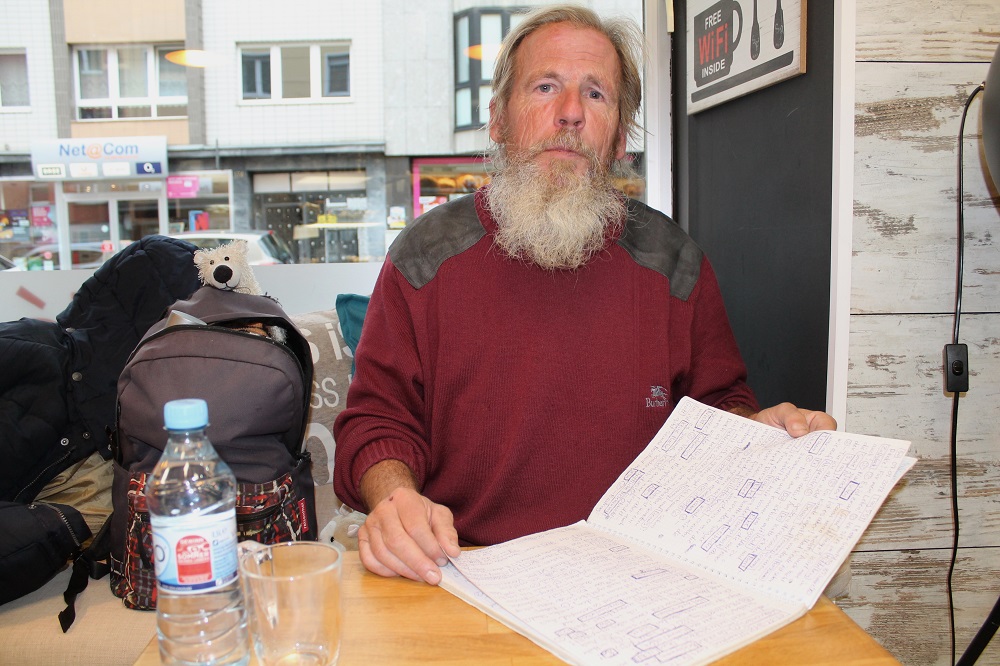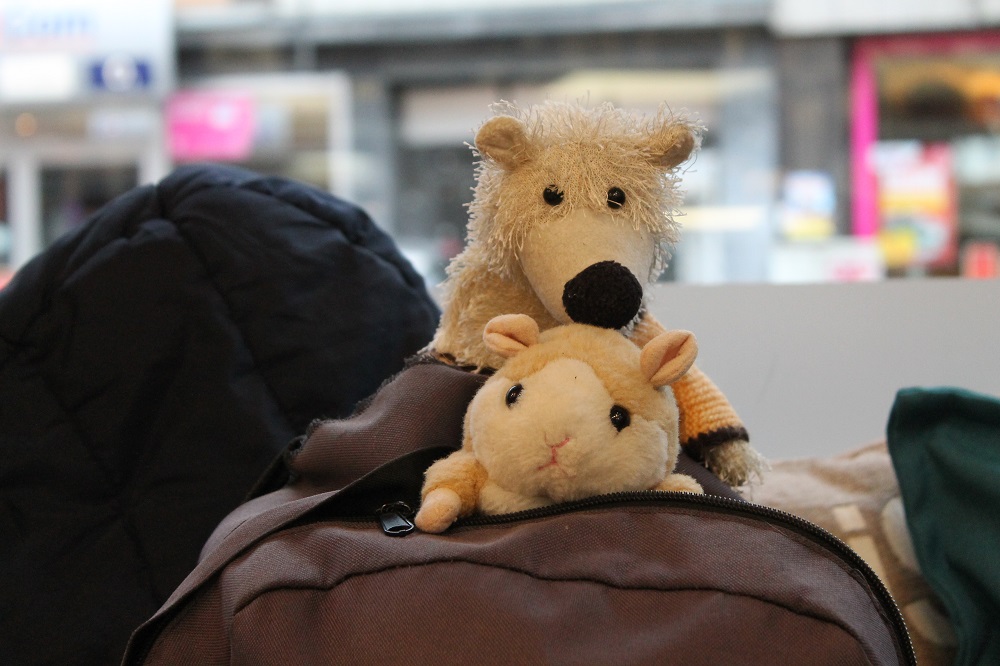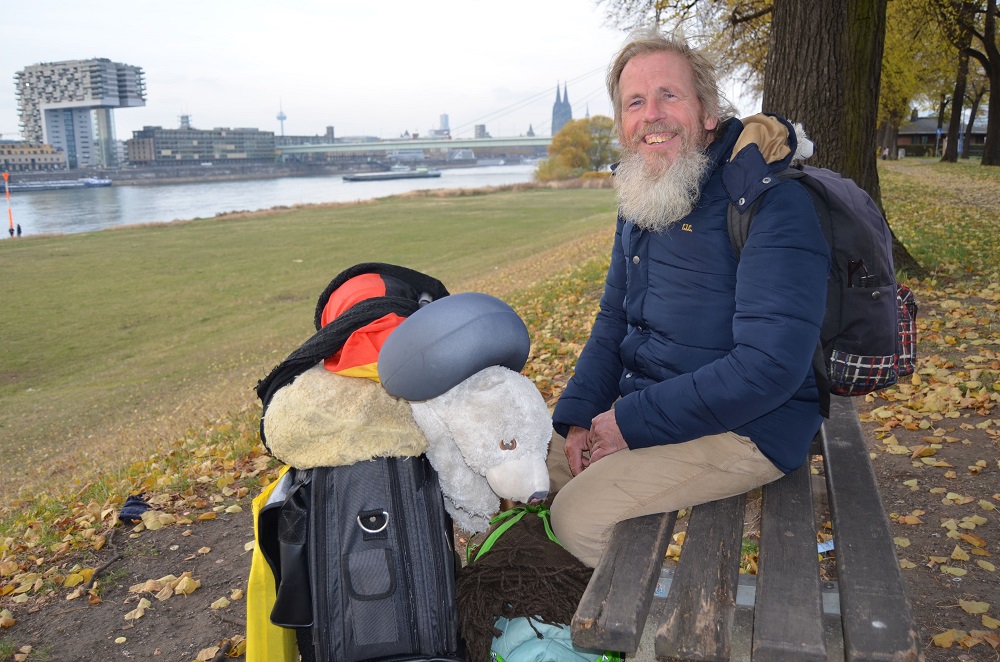By Sabrina Burbach, Draussenseiter
57-year old Draussenseiter vendor Lothar likes to start his day with a coffee. But that’s only if his budget will allow it. Today, things are looking good. He is sitting in a self-service bakery in Cologne with his back to the window. The young guy at the till gives a friendly nod to the older, long-bearded guy; they know each other. Lothar likes to use his coffee breaks as a little time-out during which he can make sense of his thoughts and jot down a few things. Or, on days like today, he invites people to interview him. On the bench next to him sits a small rucksack filled with cups, a bottle, two mascots and his travel diary—a chequered A4 ring binder in pristine condition with pages full of neat block print. Among other things, this is where he records the walking trips he goes on from Cologne. He has a lot to talk about. When Lothar starts walking, he doesn’t just walk five kilometres in any old direction. He’s usually away for a little while longer, more like three and a half months—and on foot.
Lothar first started walking on 5 July 2016, when he set off with just two fleece jumpers in a fabric bag. It was a trip that would take him from western Cologne to northern Hamburg, then onwards to Schleswig in the very northern tip of Germany, and finally all the way back down south to Munich: a journey totalling almost 2,000 kilometres. Lothar can still remember that first day in detail. “Ever since that day I’ve been ‘outside’,” he says. By that, he means out of his flat and away from city life. In hindsight it might almost seem like he had fled. And perhaps that was the case; Lothar can’t quite say. He did have unsettled debts at the time that resulted from the abuse of trust and expensive telephone bills. Since then, he has never gone back to a life lived within four walls. No one could have seen it coming. Lothar, who is originally from Essen in western Germany, is the middle child of five siblings. His father worked at the police school and before Lothar started school the family moved to the nearby Rhineland, where Lothar has lived until today. He finished school, specialising in maths and physics, went on to study engineering at the Technical University in Cologne, worked as a chartered engineer for 25 years, and got married.

An easy life
From one day to the next, Lothar swapped a normal daily life for a life out on the streets. What sort of person would do that? Lothar is someone who has always enjoyed being outside in nature and believes that there must be more to life than society lets on. Or rather, there is less to life: less consumption, less stuff, perhaps also less responsibility—at least when it comes to red tape. It is possible to live an easy, simplified life. “You really don’t need that much,” Lothar says. “Whatever you have, you will always be in contact with others.” Lothar has experienced that himself. One time, a sales assistant in a pharmacy gave him a blister plaster for his rubbed feet. Another time, a woman gave him ten euros because she said she had dreamed she should help someone. Lothar usually only accepts donations in kind, and only as much as he can use himself. When he has too much of something, he gives it away to someone else.
The former engineer doesn’t need a GPS on his travels either. When he’s travelling over land, and wherever possible, he finds his bearings according to the position of the sun, and rather than looking at a phone screen while he walks, he allows his eyes to wander across the landscape. “When you walk, you think quite differently, and you automatically take more time to notice things,” Lothar explains. “You just see more.” Lothar sees walking as his life’s mission and views his ‘awakening’ in a rather literal sense: “Don’t stick in the past: discover something new,” is how he sums it up. That’s how, in the summer of 2016, his feet led him to Schleswig, where he visited his mother in an old people’s home. He also wanted to see his sister in Brunswick, but when he arrived, she wasn’t there. He hadn’t contacted her beforehand, so he left her a letter. “I wanted her to know that I was okay,” he says. Up until that point, he hadn’t known that his family had filed a missing person’s report after his sudden departure. Only later, when the police spoke with him in Harz, did he realise that his family was looking for him. He wasn’t scared of the police. “My father was with the police himself and I have never done anything wrong,” he says.

Back to the Rhineland
After he returned to Cologne in October 2016, he also saw his wife, who occasionally plays the organ in a private church. They are still married. It is important to Lothar that she is ok, and the same goes for her. When his rucksack was stolen last March, she helped him without a second thought. “Everything had been taken: my swimming trunks, my jumpers and many of my mascots—my companions,” he says. “The thief had only left behind a few little things for me. My wife brought me new animals and a new rucksack.” One of these was a hamster called Anja-Marie, who sits with him at the table along with the little polar bear Lukas. The big polar bear Albertus-Magnus, named after a Catholic saint, is stowed away with his other things where he sleeps.
When he’s not away travelling, Lothar has a daily schedule. After his morning coffee, and depending on the weather, he sets out towards Krebsgasse by the Cologne Opera to sell Draussenseiter. Twice, he has led a tour around the city; tours given by homeless people to show the city from their perspective. On Sundays he goes to mass and sings tenor in the Melanchthon choir, for which he has a special jacket in his rucksack. “The choir is a good opportunity for me to prove my singing talent,” he says. “No one gives you odd looks there.” Odd looks are not unusual for Lothar. Once, he was standing at a bus stop when a man walked past him and saw the large polar bear tied to his carrier bag. “A grown man with a toy, what the hell!” the man muttered as he walked past. Lothar doesn’t react to such comments anymore. He prefers to start a conversation with people and tells them about his life when they ask him. “A person’s dignity is very important to me,” Lothar says. “Homeless people should be given more respect. At the end of the day, everyone can do something: they just have to find out what that is.”

Away on a new journey
His family haven’t found it easy to come to terms with Lothar’s current lifestyle. But he couldn’t imagine going back to living in a flat, which he calls a “concrete construction”—although he would consider living in some sort of wooden house. And then there’s the desire to only use as much as he needs; to put a stop to excessive consumption and to live independently from the system as far as possible. Lothar’s first journey showed him that that was possible, even if the travel notes he made at that time are sadly now lost. But, for Lothar, that’s not a bad thing, as that particular journey is over. In autumn 2018 he returned from his second journey, which he also detailed meticulously in a diary. Written on chequered paper and in block print, the diary included details about his mealtimes and overnight stays and was peppered with smileys and cross-references. You can recognise the engineer in his handwriting, even though Lothar has said goodbye to that side of himself. He still has a structured way of thinking too. Lothar views that as being mainly a practical skill, particularly in winter. “I always sleep with one sleeping bag inside another because it insulates so much better,” he says. “I would definitely recommend that to everyone,” he concludes, as he gives his notes a brief glance at his notes and finishes the last of his coffee.
Translated from German by Heather Davies




















